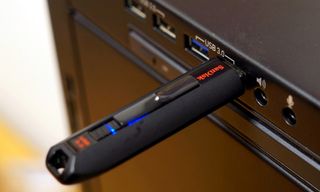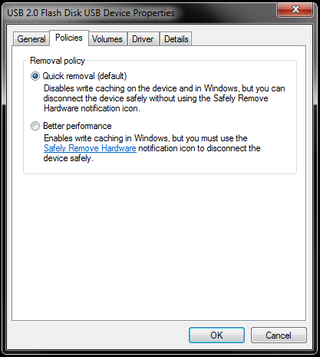Do you need to "eject" USB flash drives?

Ask PC Gamer is our weekly question and advice column. Have a burning question about the smoke coming out of your PC? Send your problems to letters@pcgamer.com.
Is it necessary to "eject" a USB flash drive before unplugging it from a computer? — Jasper
On Windows, not usually. Obviously, don't remove a drive while transferring data, as you'll corrupt that data, but that's a no-brainer. The main reason for hitting "eject" or "safely remove hardware" is write caching. With write caching on, even if whatever you're transferring is "done," there still may be data hanging out in the cache, waiting for the cue to finish up. Ejecting it sends that message.
But Microsoft has been aware for some time that we like to pop USB drives out at our leisure, so Windows automatically disables write caching for removable flash drives. In Windows 7, if you right-click on a drive and select "Properties," then find it in the "Hardware" tab, then hit "Properties" again (or get there through the Device Manager in a less roundabout way), and head to the "Policies" tab, you can see that "Quick removal" is the default. That ensures that if it says it's done transferring data, it's actually done, and it's safe to remove the drive.

But be careful. Windows doesn't necessarily disable write caching for external hard drives, so check first—and if there's a lot of important data on it, you may as well be safe and always eject it properly. Even with write caching off, it's possible that data will be tied up with some background process on your PC. On that note, I never recommend working on a file while it's on a removable flash drive—transfer it to your non-removable storage first.
But either way, if I'm ejecting my 1TB external HDD, which I use to backup important stuff I don't want on my main HDD, then yeah, I go through the safe removal process.
The more cautious among us, who would describe frightening stories of damaged cells, will say that you should always, always safely remove any kind of USB drive. My technical advice: Live a little. When it comes to smaller USB drives, I don't bother. It's not like I'm transferring top secret files of which there's only one copy. The worst that might happen is that I corrupt some data and transfer it again, or have to reformat the drive. Not too scary, and if your flash drive ever dies, it probably wasn't because you didn't click "safely remove hardware" every time. Exposure to heat, physical damage, and wear from writing data and plugging/unplugging (USB plugs only last for so long) are far more likely to hurt it. Keep your big external drives safe by safely ejecting them, but there's no need to be nervous about removing a USB stick as long as you've let any transfers complete.
The biggest gaming news, reviews and hardware deals
Keep up to date with the most important stories and the best deals, as picked by the PC Gamer team.

Tyler grew up in Silicon Valley during the '80s and '90s, playing games like Zork and Arkanoid on early PCs. He was later captivated by Myst, SimCity, Civilization, Command & Conquer, all the shooters they call "boomer shooters" now, and PS1 classic Bushido Blade (that's right: he had Bleem!). Tyler joined PC Gamer in 2011, and today he's focused on the site's news coverage. His hobbies include amateur boxing and adding to his 1,200-plus hours in Rocket League.
Most Popular





